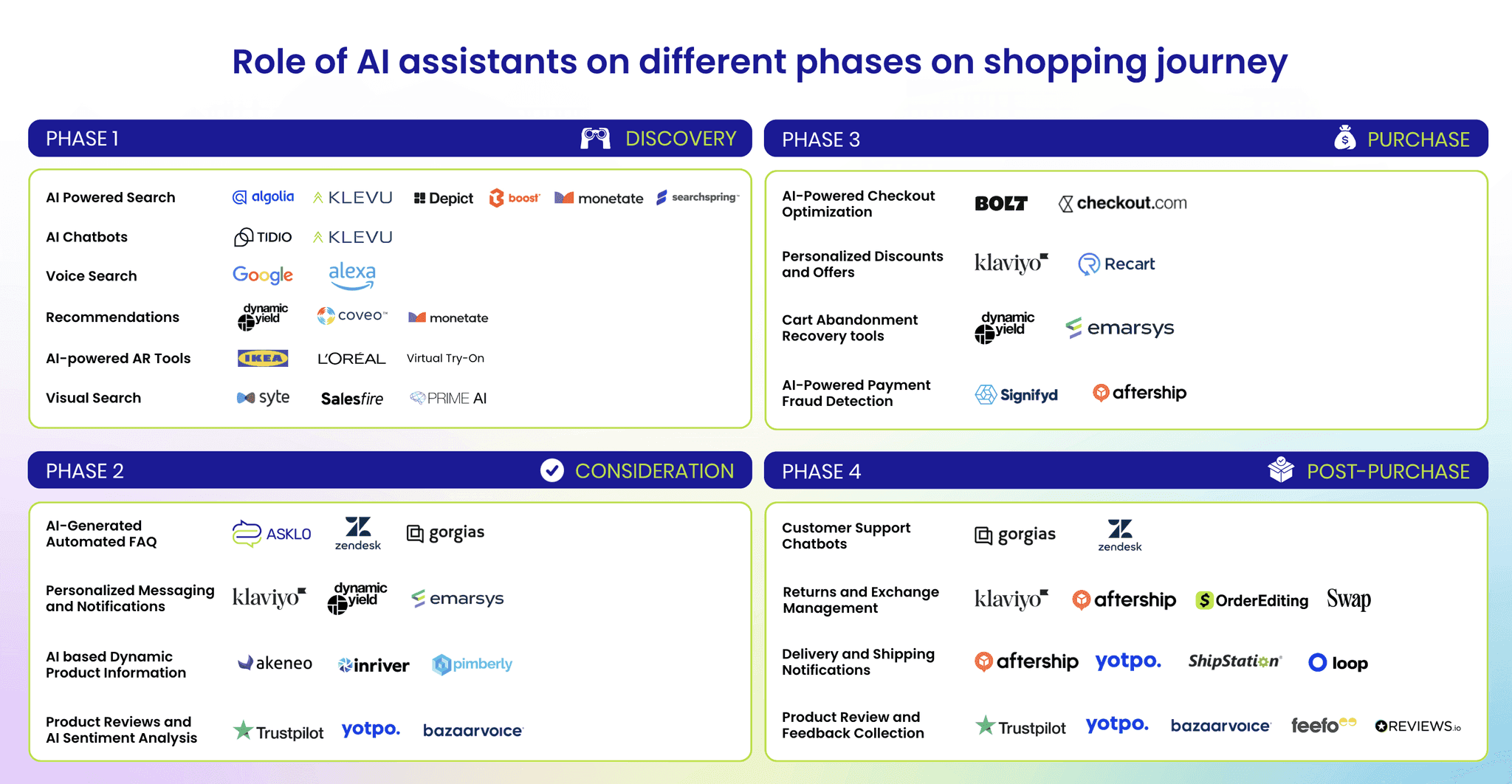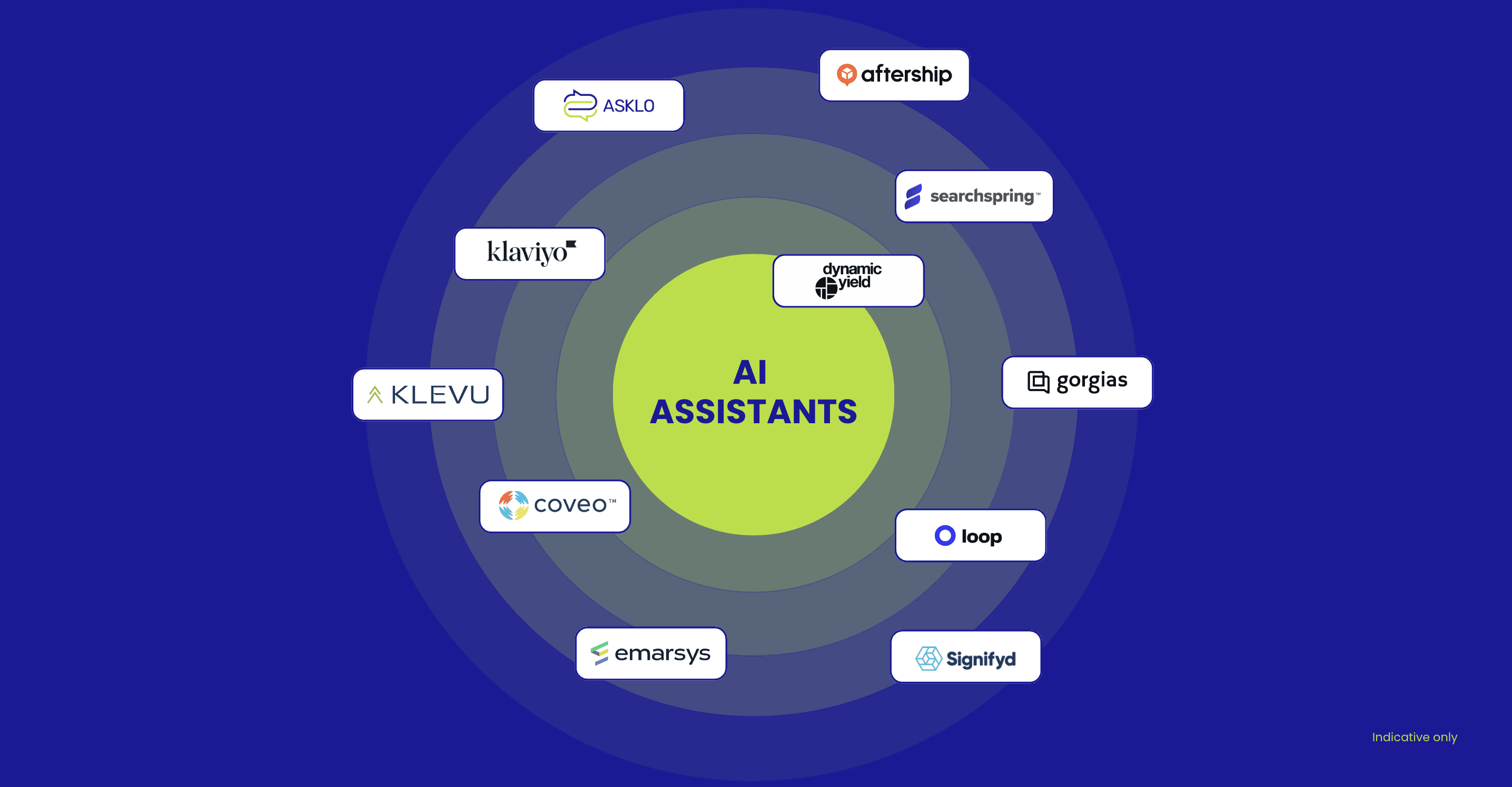Oct 7, 2024

In the rapidly evolving world of eCommerce, AI assistants are reshaping how merchants engage with customers, streamline operations, and drive growth. From personalizing the shopping experience to automating repetitive tasks, AI is proving to be a game-changer. In this guide, we’ll explore how AI assistants are transforming eCommerce.
The role of AI Assistants goes beyond customer service. Here is how AI-driven solutions are transforming every touchpoint of the shopper’s journey.
1. Discovery Phase
“Finding the Perfect Match: AI-Powered Product Discovery"
Most of the online stores have invested in at least the first two of the following areas and adopted AI driven solutions to make their shoppers’ product discovery experiences better.
[Must have] AI Powered Search to understand user queries better, providing relevant search results and suggestions. These search engines can understand context, synonyms, and even misspellings, delivering fast, accurate, and personalized search results.
Popular AI Tools: Klevu, Algolia, Coveo, Searchspring
[Must have] Personalized Product Recommendations to analyze customer behavior, purchase history, and browsing patterns to suggest products that match a shopper’s preferences. These recommendations can be displayed on homepages, product pages, checkout pages, or via email marketing to boost engagement and conversions.
Popular AI Tools: Klevu, Nosto, Algolia
[Nice to have] AI Chatbot can engage shoppers in real-time, offering product recommendations, answering questions, and guiding them through the shopping process. These chatbots often provide personalized suggestions based on the customer’s search history and preferences.
Popular AI Tools: Tidio AI Chatbot, MOI by Klevu
[Nice to have] Visual Search allows shoppers to upload an image and find similar products in the store using AI image recognition. This makes product discovery easier and more intuitive, particularly for fashion or home decor, where visual matching is crucial.
Popular AI Tools: Syte, Salesfire
[Nice to have] Voice Search assistants like Alexa and Google Assistant are becoming popular for product discovery. Shoppers can use voice commands to search for products, receive recommendations, and navigate through the store without typing, adding convenience to the shopping experience. Amazon Alexa, Google Assistant are the best examples.
[Nice to have] AI-powered AR tools allow shoppers to "try on" products virtually (like clothing, accessories, or makeup) or visualize products (such as furniture) in their environment before purchasing. This enhances product discovery by allowing customers to explore products in an interactive and immersive way. You can find good examples on IKEA, L’Oreal Virtual Try-On.
2. Consideration Phase
“Instant Answers, Smart Choices: How AI Boosts Decision-Making”
For the Consideration Phase of the shopping journey, AI solutions that enhance decision-making, build trust, and provide personalized, real-time interactions are critical. These tools help shoppers feel confident about their purchases and ensure a smooth, informative experience. Here are the must-have AI solutions for the consideration phase:
[Must have] AI-Generated Automated FAQ systems generate answers based on customer queries and browsing patterns, providing instant responses to frequently asked questions. This reduces friction by giving customers the information they need without having to wait. Asklo is a leading solution in the market, enhancing product pages with pre-populated FAQs.
[Must have] AI Chatbots and Virtual Shopping Assistants offer real-time support, answering product-related questions instantly. These assistants help guide customers by providing key information like product specs, availability, and even comparing products. They also reduce the need for human customer service and keep customers engaged during decision-making. Amazon's Rufus is a prime example of a Virtual Shopping Assistant, while Zendesk and Gorgias are popular choices for AI-powered customer support solutions.
[Must have] AI powered Personalized Messaging and Urgency Notifications tools can send personalized messages or notifications that highlight relevant offers, limited-time deals, or stock alerts. These create a sense of urgency, helping customers finalize their decision faster.
Popular AI Tools: Klaviyo, Dynamic Yield, Emarsys
[Nice to have] Product Reviews and AI Sentiment Analysis tools are essential to summarize and analyze customer reviews, highlighting the most relevant feedback or overall sentiment. This helps shoppers quickly gauge product quality and make decisions without sifting through hundreds of reviews.
Popular AI Tools: Yotpo, Trustpilot
[Nice to have] Augmented Reality (AR) or Virtual Try-Ons allows shoppers to visualize products in real-time, enhancing their understanding of how a product fits or looks. This is particularly useful for apparel, makeup, furniture, and home decor. Major brands like Amazon and Ikea have already integrated AR into their online shopping experiences.
3. Purchase Phase
"Seamless Checkout: AI-Driven Path to Purchase"
At this phase, AI-driven options focus on simplifying the checkout process, offering personalized incentives, and ensuring a seamless and secure transaction. These tools help reduce cart abandonment, increase conversion rates, and create a smooth, user-friendly experience for customers. Here are the key AI-driven options for the purchase phase:
[Must have] AI-Powered Checkout Optimization can simplify and personalize the checkout experience by streamlining steps, auto-filling information, and offering real-time assistance to reduce cart abandonment. These systems can predict which payment methods or shipping options are most likely to be selected based on user behavior.
Popular tools: Bolt, Checkout.com, Shopify's AI-Powered Checkout
[Must have] Personalized Discounts and Offers tools analyzes a shopper’s browsing and purchase history to offer personalized discounts or deals that encourage them to complete the purchase. Offering these incentives at the right moment can significantly reduce the likelihood of abandonment.
Popular tools: Dynamic Yield, Emarsys
[Must have] Cart Abandonment Recovery tools can predict when a customer is likely to abandon their cart and send automated, personalized messages or offers to nudge them towards completing the purchase. These messages can be in the form of email reminders or pop-up offers.
Popular tools: Klaviyo, ReCart
[Nice to have] AI-Powered Payment Fraud Detection systems can detect and prevent fraudulent transactions in real-time by analyzing transaction patterns, payment behaviors, and unusual activities. This ensures a secure shopping experience for both the customer and the store.
Popular tools: Signifyd
4. Post-Purchase Support
"Beyond the Buy: AI-Enhanced Post-Purchase Care"
For the Post-Purchase Support Phase, AI-driven options focus on enhancing customer satisfaction, streamlining communication, and encouraging long-term loyalty.
[Must have] AI-Powered Customer Support Chatbots provide 24/7 support for post-purchase inquiries such as tracking orders, handling returns, or answering common questions. These bots can automate repetitive tasks and escalate complex issues to human agents when necessary.
Popular tools: Gorgias, Zendesk
[Must have] AI driven Delivery and Shipping Notifications tools can send personalized post-purchase emails or SMS updates, such as order confirmations, shipping updates, and review requests. These communications build trust and ensure customers stay informed about their purchase.
Popular tools: Klaviyo, AfterShip, Yotpo
[Must have] AI-Powered Returns and Exchange Management tools streamline the returns and exchange process by guiding customers through automated workflows, ensuring smooth handling of refunds or replacements. These systems also analyze patterns to identify potential issues with specific products.
Popular tools: Klaviyo, AfterShip, Loop Returns, Swap, OrderEditing
[Must have] AI-Driven Product Review and Feedback Collection tools can automate the process of collecting product reviews and feedback from customers after a purchase. These systems also analyze sentiment from reviews, providing insights into customer satisfaction and areas for improvement.
Popular tools: Yotpo, Trustpilot, Reviews.IO
AI assistants are transforming eCommerce by streamlining every phase of the shopper’s journey, from discovery to post-purchase. By automating tasks, personalizing experiences, and providing real-time support, AI tools help merchants boost customer satisfaction, increase conversions, and improve efficiency. In a competitive market, adopting these AI-driven solutions is essential for Shopify merchants looking to enhance their product pages and deliver a superior shopping experience.
Instantly answer customers questions with
Asklo AI assistant
Get started for free and start creating delightful experiences

